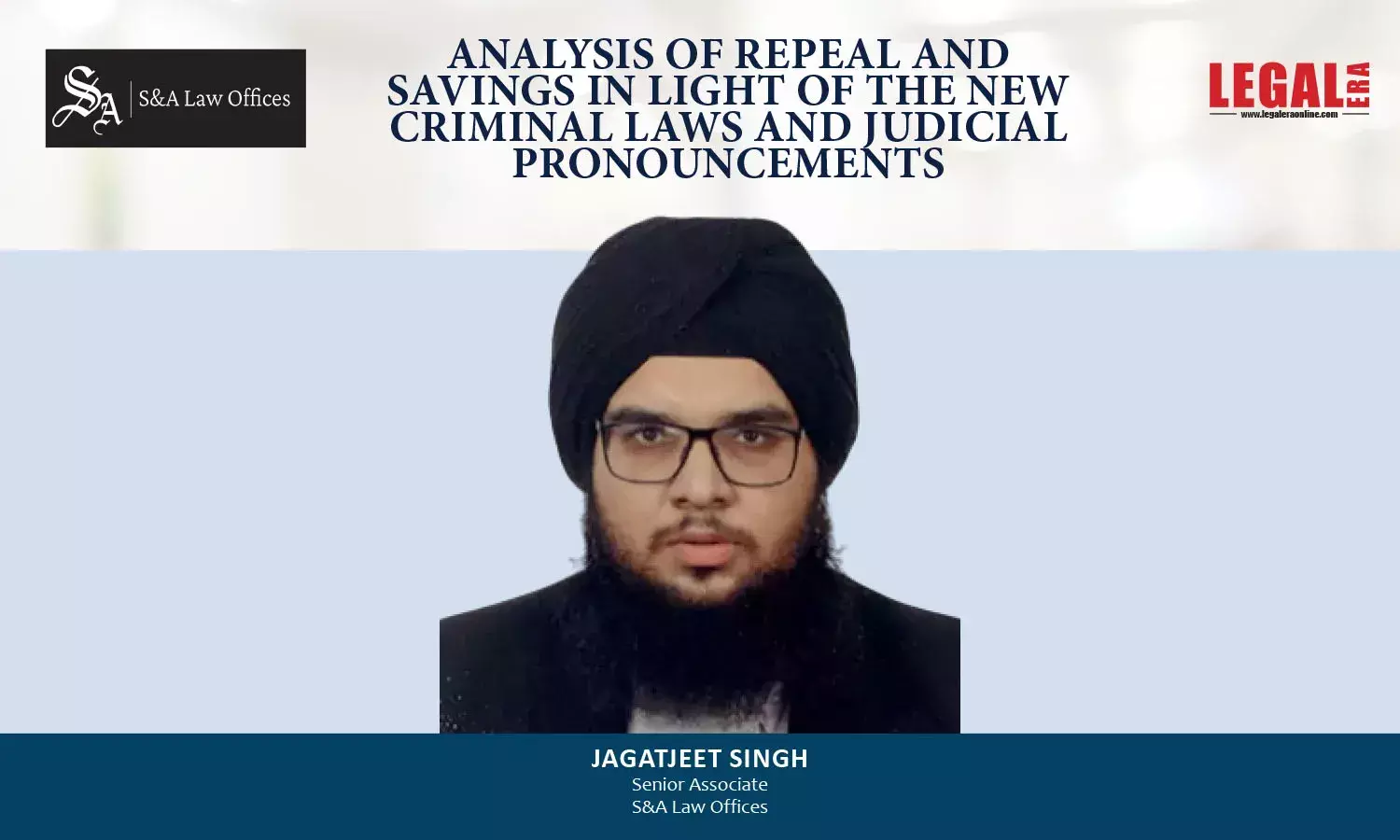Analysis Of Repeal And Savings In Light Of The New Criminal Laws And Judicial Pronouncements

Analysis Of Repeal And Savings In Light Of The New Criminal Laws And Judicial Pronouncements
Introduction
The legal landscape is constantly evolving, particularly in the realm of criminal law. Recent legislative changes and judicial pronouncements have brought the concepts of repeal and savings into sharp focus. Understanding how these concepts interact with new criminal laws is crucial for legal practitioners, lawmakers, and the public at large.
New Criminal Law
The India Parliament on 25.12.2023 enacted three laws, the Bharatiya Sakshya Adhiniyam (“BSA”), Bharatiya Nagarik Suraksha Sanhita (“BNSS”) and Bharatiya Nyaya Sanhita (“BNS”) to replace the Indian Evidence Act, 1872, Code of Criminal Procedure, 1973 (“CRPC”) and Indian Penal Code, 1860 (“IPC”), respectively which came into force on 01.07.2024. The said current laws were enacted to replace the archaic laws established in the British era and evolve the laws to the times of today except the Code of Criminal Procedure, 1973 which was enacted on 25.01.1974. Whether or not the new laws are modern enough or have achieved their purpose is a separate discussion, not being divulged in this article. Rather, this article provides an analysis of the implications of repeal and savings clauses in light of recent developments and judicial pronouncements.
‘Repeal and Saving’
On 1st of July 2024, the general public along with the law enforcement agencies and the legal fraternity were in a state of confusion as to what criminal law would apply to them in pending and future cases.
To resolve such confusion, one must at first refer to Section 531 of BNSS and Section 484 of CRPC. Section 484 of CRPC and Section 531 of BNSS are identical word to word, the only difference is that Section 484 of CRPC refers to the repealed Code of Criminal Procedure, 1898 and Section 531 of BNSS refers to the repealed CRPC. It is therefore safe to say that the implication of the said Sections would be same. Thus, judicial pronouncements and interpretations of Section 484 CRPC would apply to Section 531 of BNSS.

Section 484 of CRPC and Section 531 of BNSS state that on the date before the which this code/ act comes into force, if there is any appeal, application, trial, inquiry or investigation, the same shall be disposed of, continued, held or made as the case may be in accordance with the provisions of the Code of Criminal Procedure, 1898/ Code of Criminal Procedure, 1973. The literal interpretation of these sections would conclude that for pending FIRs, investigations, trials, appeals and inquiries before the 1st of July 2024, provisions of CRPC, 1973 shall apply. That is also to say that provisions of BNSS shall only apply to FIRs, investigations, trials, appeals and inquires after 1st of July 2024.
Furthermore, it is well settled principle of criminal jurisprudence that criminal laws are generally not retrospective in nature unless the same are specified to act retrospectively. The same is to justify that a person be punished for a crime which was a crime at the time the said person committed such an act and also that the said person be given punishment in accordance with the law at the time when the said person committed such an act.
Judicial Pronouncements since 01.07.2024
As it is foreseeable, the Hon’ble High Courts have in the past three months have decided various petitions on questions of law pertaining to the implications of the change in criminal laws and criminal procedure.
The Rajasthan High Court in cases titled Krishan Joshi v. State of Rajasthan1, while deciding a Petition under Section 482 of CRPC after 01.07.2024 for a FIR registered on 02.02.2024 held that Section 531(2) of BNSS means that all ongoing proceedings under the old code shall not be disrupted by BNSS. The Hon’ble High Court interpreted that all rights of the accused in an FIR and/ or under trials and/ or convicts under appeal and the legal expectations formed under the CRPC are required to be protected. The Hon’ble High Court of Rajasthan held that the Quashing Petition under Section 482 of CRPC was maintainable as it was out of an FIR which was registered before 01.07.2024 and as such any action on the said FIR would be covered by the old code, CRPC 1973.
The Punjab & Haryana High Court at Chandigarh in case tiled X v. State (UT of Chandigarh)2 has on the other hand taken an opposite view regarding the maintainability of a petition filed after 01.07.2024 for quashing an FIR registered before 01.07.2024. The Hon’ble High Court observed that upon the introduction of the new procedural law, BNSS, the same would apply to cases initiated under IPC as well from and after 01.07.2024 as well as future proceedings except the pending appeals, applications etc. The P&H High Court placed emphasis on the word pending and interpreted it to mean only the actual pending appeals, applications etc. and not the wider meaning as observed by the Rajasthan High Court.
The Kerala High Court in case titled Abdul Khader v. State of Kerala3, while deciding an issue on the applicability of the BNSS or CRPC in appeal proceedings arising from a trial which was completed under the provisions of the old code, held that on completion of the said proceeding under CRPC further steps ought to be taken under the BNSS. The Hon’ble Court further held that the date of the judgment in any case had no bearing as to if CRPC or BNSS would apply, the only bearing would be that if the said appeal was filed before or after 01.07.2024. On the same lines, the High Court of Delhi in case titled Prince v. State (NCT Of Delhi)4, while deciding an application for bail ordered that in case the bail application was filed post 01.07.2024, the same ought to be filed under BNSS. The date of the registration of the FIR had no bearing what was again to be seen was the date of filing of the bail application.
Similarly, the High Court of Judicature at Allahabad among various other High Courts have also observed and held on the same side that the date of the FIR or the act under which the preceding proceeding was decided is immaterial, what has to be seen is that if an action was constituted before 01.07.2024, the same would fall under a pending action as per Section 531(2)(a) of BNSS and would be adjudicated under the old code i.e., the Code of Criminal Procedure, 1973. However, if such an action is constituted after 01.07.2024, the same would be adjudicated under the BNSS.
On the other hand, the full bench of the High Court of Gujarat in case titled Hiralal Nansa Bhavsar v. State of Gujarat5, under consideration of Section 484 of CRPC, 1973 at a time when the older code (CRPC, 1898), had held that ‘if a trial is conducted under a particular procedural law, then an appeal against such an order/ judgment shall also be governed by the said procedural law as an appeal is in continuation of a trial’
Conclusion
The Hon’ble Supreme Court is yet to decide upon this complex issue. An SLP has been preferred challenging the above judgments of the High Court of Punjab & Haryana at Chandigarh and the High Court of Rajasthan, wherein Notice has been issued and the matter is still pending adjudication before the apex Court.
Most High Courts have interpreted Section 531 of BNSS to mean the instant pending investigation, inquiry, appeal or application that remains pending before 01.07.2024 and any subsequent action from an investigation, inquiry, appeal or application even though before 01.07.2024 shall be adjudicated upon under the provisions of BNSS if the same is filed on or before 01.07.2024. This interpretation is inconsistent with the decision of the High Court of Gujarat while interpreting similar issue.
Disclaimer: This article was first published in the S&A Law Offices - 'Indian Legal Impetus' newsletter in October 2024.
2. MANU/PH/3009/2024
3. 2024 SCC OnLine Ker 3919
4. 2024 SCC OnLine Del 4909
5. 1974 SCC OnLine Guj 65

